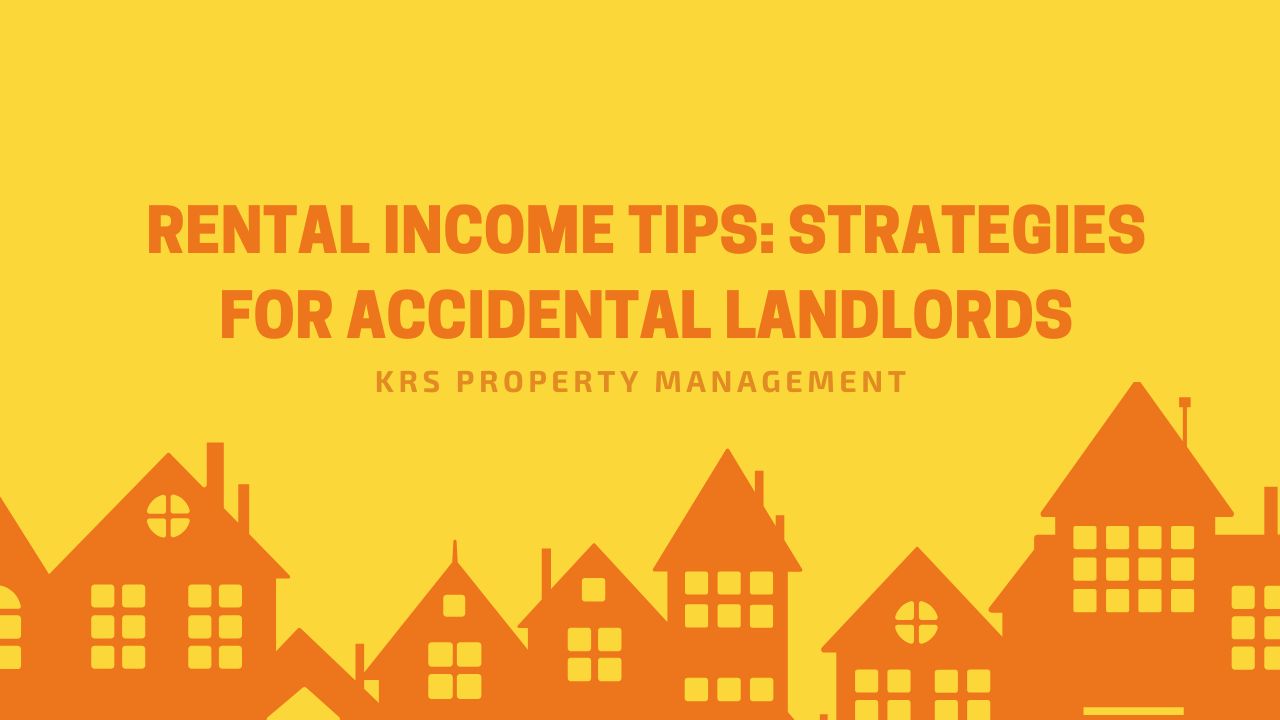Key Takeaways
Turn Circumstances Into Opportunity: Accidental landlords can transform an unexpected situation into a steady income stream by adopting a professional, business-focused approach to property ownership.
Prioritize Smart Management: From setting the right rental price to thorough tenant screening and financial planning, success depends on organization, consistency, and informed decision-making.
Leverage Professional Support: Partnering with a reliable property management company like KRS Property Management can simplify operations, improve tenant retention, and maximize rental returns.
The real estate market has a unique way of transitioning ordinary property owners into unexpected investors. Deciding to hold on to a property that is not selling, relocating for work, or inheriting a family home are just a few examples that give rise to what people commonly call “accidental landlords”.
Whereas active investors intentionally purchase properties for rental income, accidental landlords typically enter the rental market due to circumstances rather than design.
Although their entry was unplanned, by approaching property management with diligence and strategy, accidental landlords have an equal opportunity to build long-term wealth and generate consistent income.
In this article from KRS Property Management, we will explore proven strategies and practical rental income tips that accidental landlords can leverage to maintain compliance, operate efficiently, and maximize returns.
Understand Your Role as an Accidental Landlord
At the outset, an accidental landlord is someone who unintentionally manages a rental property. This may be as a result of relocating for employment, deciding to rent the property during an unfavorable sales market, or inheriting a home from a relative.
Although the initial idea is simple, earn rent every month, accidental landlords later discover that managing rental property as a business is not passive. It requires professionalism, consistency, and knowledge.

To be successful in this role, you need to shift your perspective. Instead of considering the property as a personal asset, think of it as a financial instrument capable of generating predictable revenue when strategically managed.
Tips for Accidental Landlords
Here are some practical tips to help accidental landlords make the most of their rental property.
1. Adopt a Business Mindset
The first and most crucial step that accidental landlords should use in this transformation is to adopt a business-oriented mindset. Treat the rental property as a business, you need to make data-driven decisions, maintain records, and establish systems.
To professionalize the rental operations, the following steps are essential:
Establish a Legal Entity: This may be a Limited Liability Company (LLC) or similar structure to separate personal and business finances and protect personal assets from possible liabilities.
Open Dedicated Bank Accounts: This is a business account where all payments for rents, deposits, repairs, and maintenance will be made.
Keep Accurate Records: Invoices, receipts, property tax documents, and contracts should be properly kept and well-organized for compliance and easy reference.
Develop a Budget: The budget should include variable costs (upgrades, vacancies, and repairs) and fixed expenses (insurance, taxes, and mortgage).
When you approach rental ownership as a structured business, you create transparency and can make informed financial decisions.
2. Set a Suitable Rent Price
One of the most essential decisions you will make as a landlord is determining a suitable rental rate. If it is too low, you unnecessarily lose rental income. When it is too high, the property remains vacant.

To set the right tent price, the following tips are recommended:
Conduct Market Research: Look for similar properties within the neighborhood so you can make an accurate comparison. Assess the following factors:
Property Size and Condition: Desirability is boosted by modern appliances, landscaping, and an updated interior.
Location and Amenities: You can justify premium pricing if the property is close to shopping centers, transportation, and schools.
Seasonal Trends: The demand for rental properties fluctuates with seasons, and peak periods attract higher rates.
Perform Annual Assessments: Rents are not static but keep changing with time. Conducting annual reviews will help you stay competitive and ensure tenant retention by aligning rents with market trends.
Use professional tools and local real estate reports to obtain valuable benchmarks. If you want pricing accuracy, we advise that you hire a property management company or real estate agents who specialize in this area.
3. Perform a Thorough Tenant Screening
Having quality tenants is the foundation of a stable rental income. Most accidental landlords often overlook tenant screening because they believe all renters are the same. This error leads to property damage, late payments, or costly evictions.
To successfully perform thorough tenant screening, you need to do the following:
Pre-Qualify Applicants: Here, desired move-in dates, employment status, and income levels are confirmed before scheduling viewings
Background Checks: Use reputable screening services to review criminal records, eviction reports, and credit history
References and Employment: To assess their behavior and reliability, contact previous landlords and employers
Comply With Fair Housing Laws: The screening process should comply with federal and state fair housing laws to avoid claims of discrimination.

4. Strategically Manage Finances
The difference between successful landlords and struggling ones depends on how they manage their finances. We always advise accidental landlords to plan for the inevitable expenses that accompany rental property ownership, apart from the income.
This will involve two major components:
Creating a Financial Plan: Track monthly cash flow by subtracting all the operating expenses from the rental income.
Build an emergency fund using 10% to 15% of the rental income (this will handle unexpected repairs or vacancies).
Account for capital improvements or long-term upgrades that attract higher-quality tenants and boost property value.
Review insurance coverage to ensure that the landlord's insurance is adequate to cover loss of rental income and liability
Consider Tax Implications: Even though rental income is taxable, there are deductions for associated expenses. For that reason, accidental landlords need to track all deductible expenses, including property management fees, depreciation, property repairs, and mortgage interests.
Hiring a Certified Public Accountant (CPA) will help uncover more opportunities for legalized deductions and compliance.
Bottom Line
Accidental landlords often find themselves renting out a home due to life changes or unexpected circumstances, but with the right approach, this situation can turn into a steady source of income and long-term opportunity.
Focus on building strong tenant relationships and maintaining your property to ensure consistent returns. Quick, respectful communication and timely responses to maintenance requests go a long way in keeping tenants satisfied.
Honor lease terms, stay transparent, and offer thoughtful incentives like renewal discounts or minor upgrades to encourage loyalty.
By managing your rental with professionalism or partnering with a trusted property management company, like KRS Property Management, you can turn what began as an unplanned event into a profitable and rewarding investment.







